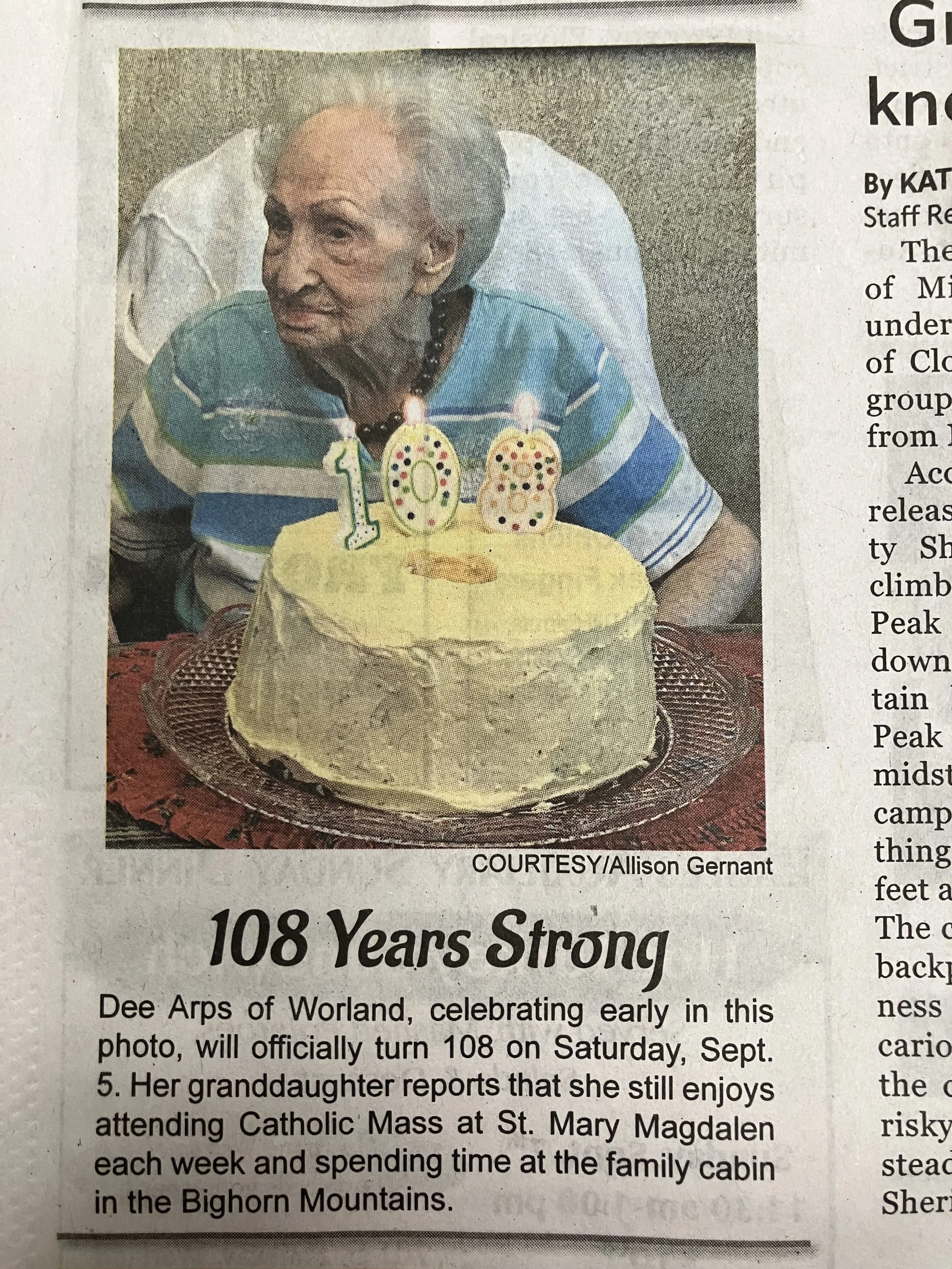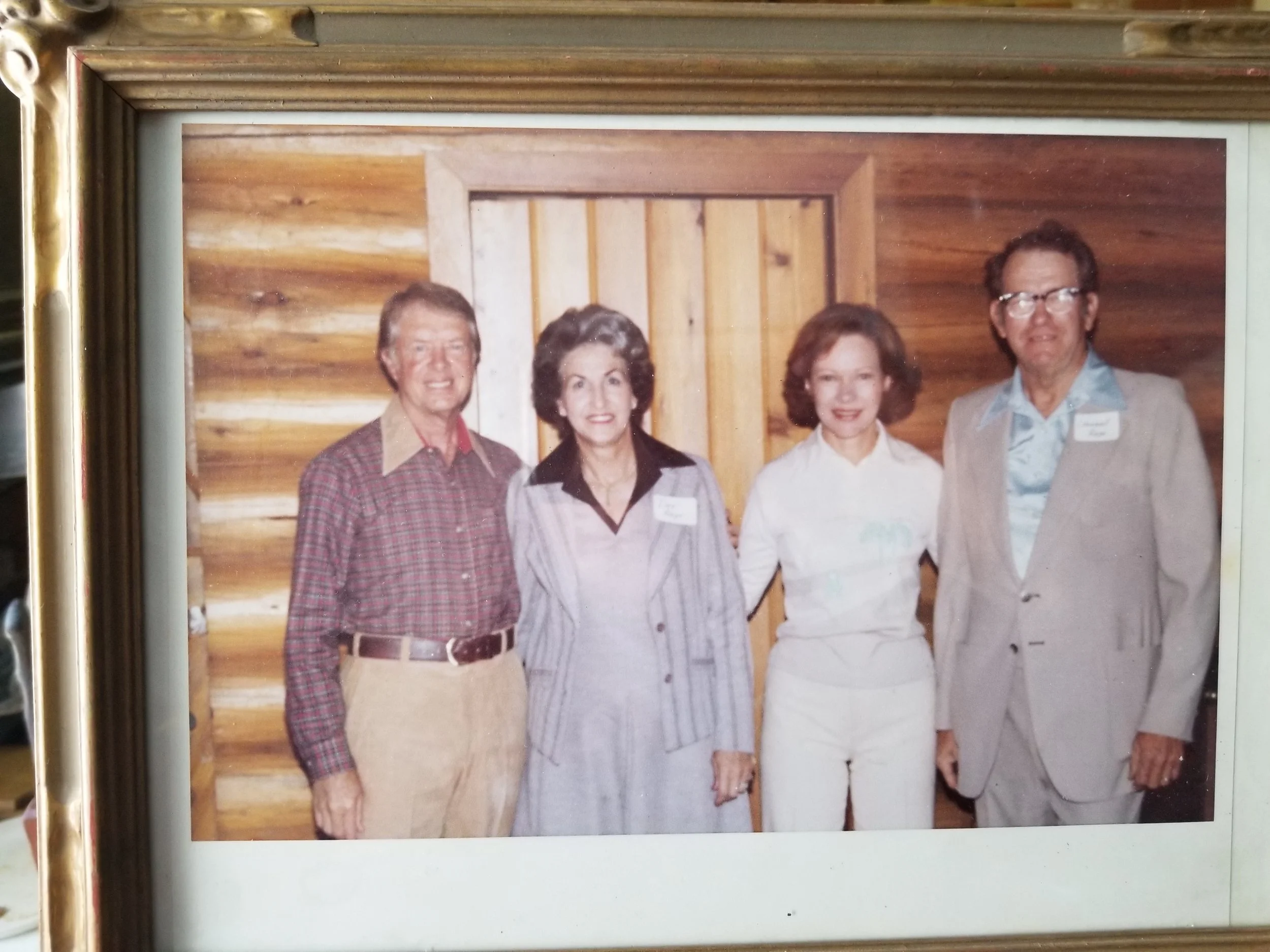Lessons from My Grandmother
Gifted by Allison
Gathered by Nancy Small
Laramie, October 2024
Allison shares a heartfelt story about her grandmother's resilience, empathy, and ability to build community across political divides. She reflects on how this legacy shapes her own approach to teaching, relationships, and self-care.
This story was gathered at the 2024 Shepard Symposium on Social Justice. The theme for that gathering was “common ground.”
Photo below provided by Allison.
Allison: I brought a story. I brought a story to share. I like your idea that stories are gifts and the reciprocity of stories as well. I've always appreciated your stories about your Grandma Ruth and your Grandma Nancy. Both grandmas. I have a story about my grandma—you know I love grandmas too. So my grandmother, I have some pictures and I can send them to you. This is Dolores and Leonard, probably around 1939 or 1940. This may have been before they came to Wyoming. They were married in 1940 and then moved from Eastern Nebraska to Wyoming—Worland, Grable, and Basin.
They were pretty self-built people. They finished their formal education in eighth grade and came from farming communities. They walked away from Nebraska and came all the way out to Wyoming. They were hard scrabble. They worked hard and owned a couple small businesses in the Big Horn Basin. My grandpa learned how to be a plumber. They had a small plumbing business and a liquor store on Main Street in Worland for 25 years. They were both Democrats in a pretty conservative part of the state—Washakie County. My grandmother was always finding common ground.
Not just because she was a business owner involved in her town of 5,000 people, Worland, and in her Catholic church, but she was always finding common ground and reasons to care about people. When I think about the theme of this symposium, she taught me so much about understanding the importance of caring for people and building community, even if you don't see eye to eye. We had a lot of political discussions growing up. I remember discussions about the Carters, Ed Herschler—he was a Wyoming governor a long time ago, and she knew him. She worked in the Wyoming Democratic Party and volunteered—Mike Sullivan, Dave Freudenthal—two other Democratic governors.
I don’t mean the theme to be so political, but she was always fighting for what she saw as truth.
Through her politics, even though she was in the minority in Washakie County, she still had friendships with people standing on the same ground—even if they saw the world differently.
Nancy: So they’re both on the same ground in terms of friendship, but not politically. Do you think it’s important to prioritize both? Because you know you're never going to be on the same ground politically with someone—like Joe in front of me—but I like him as a friend. How did she navigate prioritizing the relationships? How do you do that? What’d you learn from her?
Allison: Yeah. How did she do that? I think she was savvy and tried to see the bigger picture—that it matters more that we’re connected than that we always see the world the same way. I’m still learning from her. She’s 107, and sometimes we get it right and sometimes we don’t. It’s easier to be on common ground with people we align with. Like, when we were at the luncheon earlier, we mostly saw the world the same way. Less friction.
But maybe we need to realize that friction doesn’t always have to be pushed away. In fact, it’s part of growth sometimes.
Nancy: I hear a lineage, an ancestry of wisdom and strength through your grandmother. I’d love to hear a little bit about Allison herself. Aside from the work you’ve literally and materially been putting into this symposium…Do you actively seek common ground across difference? Do you wait and act in certain situations? Where’s Allison in the bigger picture?
Allison: Do I actively seek out common ground? I think in our training as teachers—your vocation as a teacher—you’re also a writer and a researcher, but above all a teacher. Through our practice and training, we seek common ground in the classroom, and hopefully apply it elsewhere. That’s how I think of my practice. For example, in my “America Then and America Now” class, we talked about the Japanese internment camp and Lena Newlin’s ancestors. I thought, we can create some common ground around this. Maybe that’s my practice, and then I try to find common ground in other ways.
I think it’s hard with social media. I often feel repelled and don’t even try. We get stuck in our silos. It’s dangerous in an evolutionary sense. I’d like to think our digital compulsion helps us evolve somehow, but I don’t see that yet. In a storytelling project, digital stories have beauty—like we're recording this—but also a lack of touch. A lack of humanness.
Nancy: You are one of the most consistently generous and kind people I’ve ever met. How do you take care of yourself?
Allison: Nature. Paddleboarding. Sigh, forgive, let go, move on.
Nancy: Say that again please. Four steps?
Allison: I actually have it on my bathroom wall. Let’s practice. Sigh.
Nancy: Go on. I like how you just said "sigh."
Allison: The sigh is self-care—the physical act of it. Then forgive. It’s like a tight fist to open palm. Let go—it’s just a little, "all right, let it go." And then move on. It doesn’t always work, but it helps—physically sigh, forgive, let go, move on. That’s self-care for me. Sometimes it’s about letting go of what my expectations may be.
Note: The transcript above has been condensed from its original audio recording to improve the flow and readability of the story.
Photo below provided by Allison. This photo of Jimmy and Rosalynn Carter was taken in the mid 1970s, in Jackson Hole. Her grandparents, as members of the Wyoming Democratic Party, got to greet the Carters and welcome them for their visit to the state.


